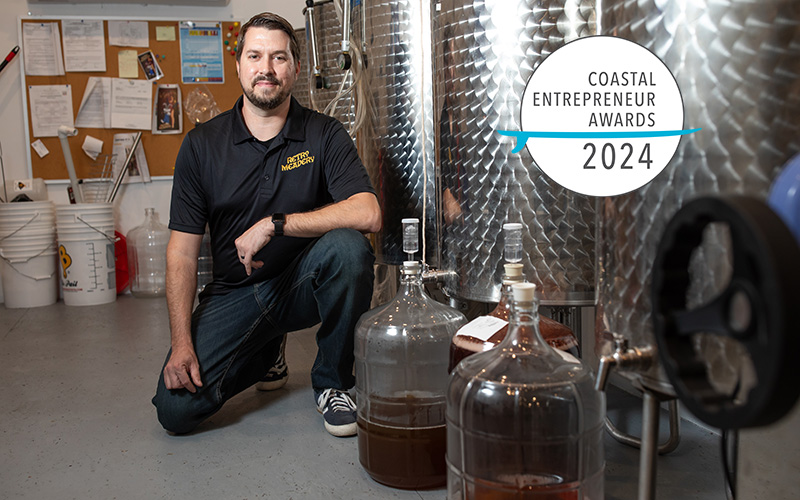With plans for construction of Enviva’s wood pellet storage facility getting the green light from the N.C. State Ports Authority, some conservation organizations are objecting to that approval and are contesting Enviva’s claims about its pellet production process.
Tuesday of this week, the Dogwood Alliance, a forest protection advocacy organization based in Asheville, held a public forum on the N.C. State Ports Authority’s decision to move forward on development of the facility in partnership with Baltimore, Maryland-based Enviva. The conservation group said it objected to the Ports Authority’s decision not to hold a public hearing on the project.
In May, several conservation groups called for such a hearing and submitted to the Ports Authority the comments of 4,500 people from the Carolinas, according to a May 13, 2014 news release from Dogwood Alliance. The request for a public hearing was denied, according to Dogwood Alliance spokesman Scot Quaranda.
About 50 people attended Tuesday’s forum to hear speakers from the Dogwood Alliance, Southern Environmental Law Center and N.C. Coastal Federation, and conservation educator Andy Wood speak about the primary reason they object to the storage facility: Enviva’s choice of wood for pellets.
The pellets would be transported from pellet plants Enviva is considering building in North and South Carolina, stored at the Port of Wilmington, and shipped to Europe to be used as fuel to produce electricity, as the European Union phases out coal as a source of energy production.
Speakers said that, contrary to its assurances that it follows sustainable harvesting practices, Enviva uses whole trees, including hardwoods harvested from habitat-rich bottomland swamps in the coastal plain. The conservationists say, furthermore, that there is little oversight on what wood is harvested because most harvesting is done on private lands, where few regulations apply.
“Forests in the U.S. capture 12 percent of our annual carbon emissions. If they are cut and shipped to Europe, we’re going to lose that,” said Derb Carter of the SELC, adding that he estimated that wood pellet production in the Southeast would swell from 1.7 million dry tons in 2013 to about 19 million dry tons by 2020.
Carter also said that old trees store larger amounts of carbon than young trees. When they are burned, not only is the stored carbon emitted, but it takes years for trees in reforested areas to gain enough carbon storage capacity to replace the trees that were harvested.
While it was clear from speakers’ remarks at the forum that they do not support the notion that wood pellets represent a low-carbon alternative to burning coal, a fact sheet distributed at the meeting states the Dogwood Alliance isn’t asking Enviva to shutter its plants; just to change what it claims are its practices.
“You don’t need to cut down entire forests to produce wood pellets,” the fact sheet stated. “There are sustainably sourced alternatives like reclaimed wood from municipal and commercial operations, urban and right-of-way trimmings, sawmill and forest residues.”
For its part, Enviva states that it does subscribe to sustainable forestry practices, and that it produces wood pellets from resources that might otherwise go to waste.
“All of the wood that Enviva uses is a byproduct of the traditional saw timber industry,” said Elizabeth Woodworth, a company spokesman, in a prepared response to questions from the Business Journal. “Regarding the use of whole trees, the only cases in which Enviva takes ‘whole trees’ are when there are low grade trees on a harvest tract that cannot be used by higher value markets due to rot, disease, pest infestation, small size, crooked form or other defects. Leaving these trees standing while taking only trees capable of delivering high-value sawtimber is known as high-grading, an unsustainable forestry practice which results in a less healthy, less biodiverse forest over time.
“Enviva also takes commercial thinnings, which are smaller, less healthy trees removed to allow larger, healthier trees to grow to sawtimber size.”
Woodworth added, ”Because of Enviva’s stringent procurement policies, which are independently audited and certified under sustainable forestry guidelines, we can ensure that all harvests are undertaken using state-mandated Best Management Practices in harvest operations that protect the environment, including water-quality and sensitive ecosystems.”
Enviva is considering wood pellet plant sites in Sampson and Richmond counties in North Carolina and Laurens County in South Carolina, Woodworth said in her statement. Product from those plants would be sent by truck or rail to the new storage facility at the Port of Wilmington.
Construction of the facility will begin soon after all permitting and related processes are complete, she said. The Ports Authority is responsible for getting regulatory approvals for construction and operation of the storage facility, Woodworth explained, including a major development permit under the North Carolina Coastal Management Act (CAMA).
“While not required for this project, the N.C. State Ports Authority chose to undertake a voluntary Environmental Assessment under the NC State Environmental Policy Act (SEPA) to ensure that the agency thoroughly reviewed all possible direct and cumulative environmental impacts and provided this information to the public,” Woodworth said in the statement. “After performing a thorough evaluation of the direct and cumulative impacts of the proposed port facility, the NCSPA submitted a proposed Finding of No Significant Impact (FONSI).”



